Roberto Battiti
Pushing the Limits of the Reactive Affine Shaker Algorithm to Higher Dimensions
Feb 18, 2025Abstract:Bayesian Optimization (BO) for the minimization of expensive functions of continuous variables uses all the knowledge acquired from previous samples (${\boldsymbol x}_i$ and $f({\boldsymbol x}_i)$ values) to build a surrogate model based on Gaussian processes. The surrogate is then exploited to define the next point to sample, through a careful balance of exploration and exploitation. Initially intended for low-dimensional spaces, BO has recently been modified and used also for very large-dimensional spaces (up to about one thousand dimensions). In this paper we consider a much simpler algorithm, called "Reactive Affine Shaker" (RAS). The next sample is always generated with a uniform probability distribution inside a parallelepiped (the "box"). At each iteration, the form of the box is adapted during the search through an affine transformation, based only on the point $\boldsymbol x$ position and on the success or failure in improving the function. The function values are therefore not used directly to modify the search area and to generate the next sample. The entire dimensionality is kept (no active subspaces). Despite its extreme simplicity and its use of only stochastic local search, surprisingly the produced results are comparable to and not too far from the state-of-the-art results of high-dimensional versions of BO, although with some more function evaluations. An ablation study and an analysis of probability distribution of directions (improving steps and prevailing box orientation) in very large-dimensional spaces are conducted to understand more about the behavior of RAS and to assess the relative importance of the algorithmic building blocks for the final results.
Reactive Sample Size for Heuristic Search in Simulation-based Optimization
May 25, 2020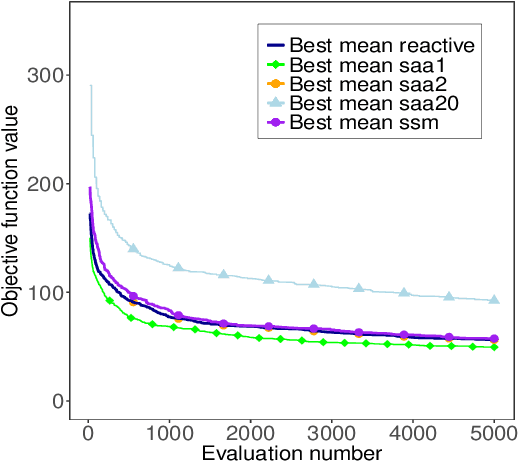
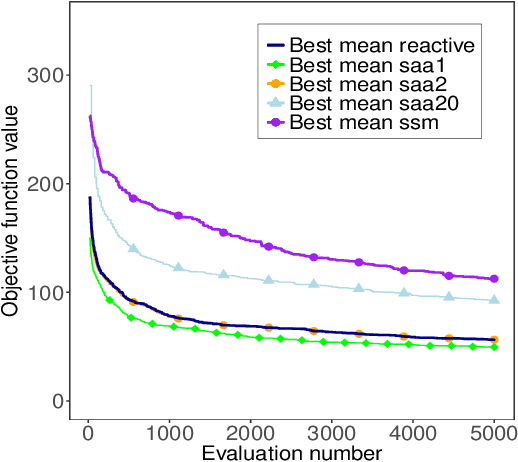
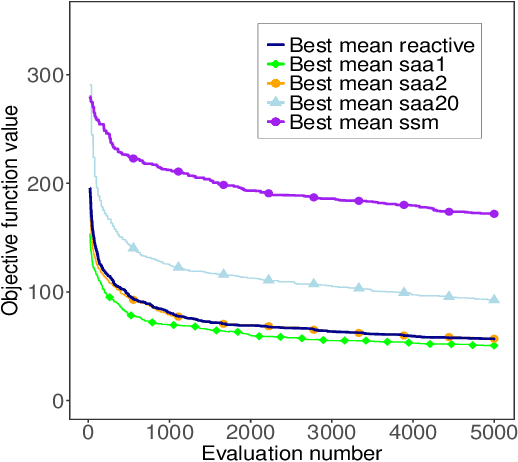
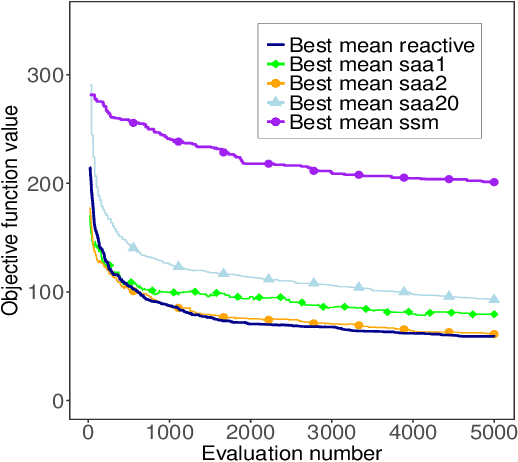
Abstract:In simulation-based optimization, the optimal setting of the input parameters of the objective function can be determined by heuristic optimization techniques. However, when simulators model the stochasticity of real-world problems, their output is a random variable and multiple evaluations of the objective function are necessary to properly compare the expected performance of different parameter settings. This paper presents a novel reactive sample size algorithm based on parametric tests and indifference-zone selection, which can be used for improving the efficiency and robustness of heuristic optimization methods. The algorithm reactively decides, in an online manner, the sample size to be used for each comparison during the optimization according to observed statistical evidence. Tests employ benchmark functions extended with artificial levels of noise and a simulation-based optimization tool for hotel revenue management. Experimental results show that the reactive method can improve the efficiency and robustness of simulation-based optimization techniques.
A Telescopic Binary Learning Machine for Training Neural Networks
Sep 01, 2015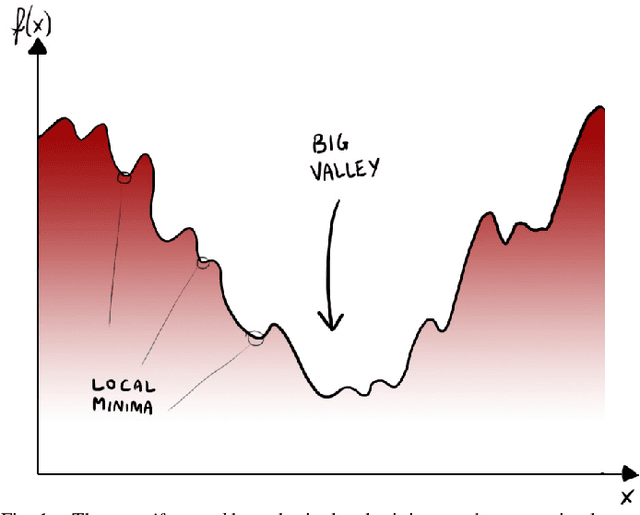
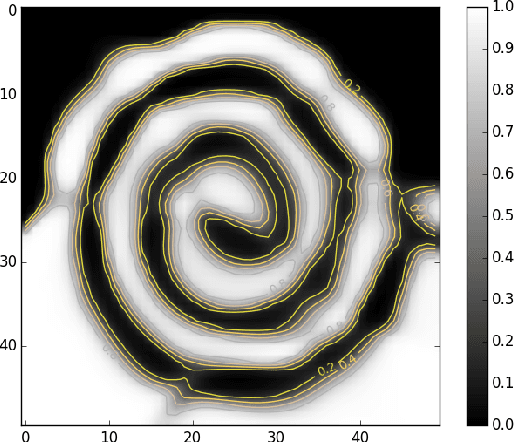
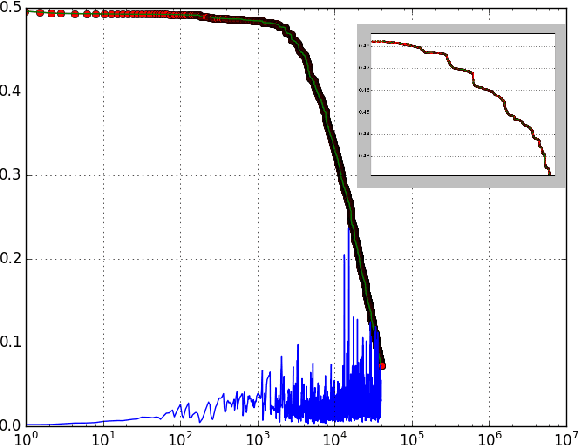
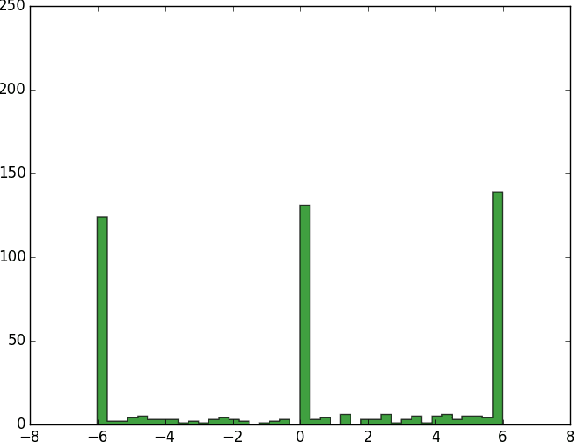
Abstract:This paper proposes a new algorithm based on multi-scale stochastic local search with binary representation for training neural networks. In particular, we study the effects of neighborhood evaluation strategies, the effect of the number of bits per weight and that of the maximum weight range used for mapping binary strings to real values. Following this preliminary investigation, we propose a telescopic multi-scale version of local search where the number of bits is increased in an adaptive manner, leading to a faster search and to local minima of better quality. An analysis related to adapting the number of bits in a dynamic way is also presented. The control on the number of bits, which happens in a natural manner in the proposed method, is effective to increase the generalization performance. Benchmark tasks include a highly non-linear artificial problem, a control problem requiring either feed-forward or recurrent architectures for feedback control, and challenging real-world tasks in different application domains. The results demonstrate the effectiveness of the proposed method.
Learning Modulo Theories for preference elicitation in hybrid domains
Aug 31, 2015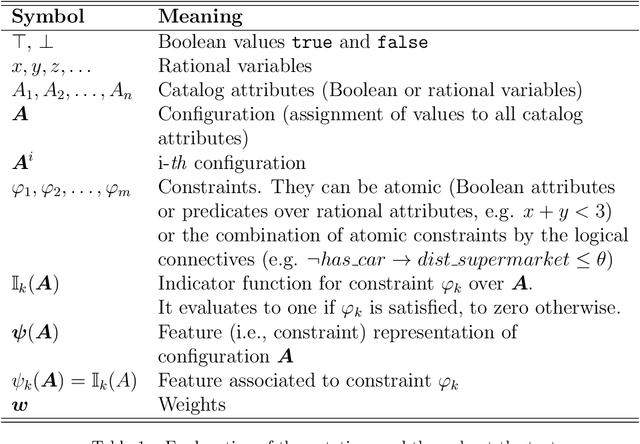

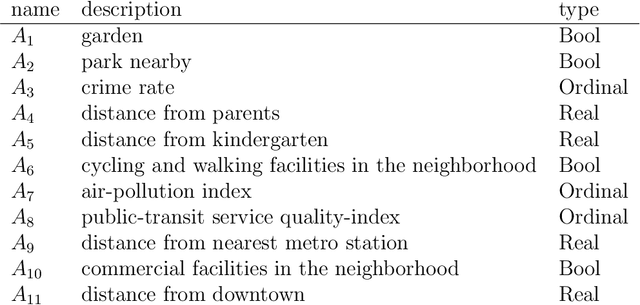

Abstract:This paper introduces CLEO, a novel preference elicitation algorithm capable of recommending complex objects in hybrid domains, characterized by both discrete and continuous attributes and constraints defined over them. The algorithm assumes minimal initial information, i.e., a set of catalog attributes, and defines decisional features as logic formulae combining Boolean and algebraic constraints over the attributes. The (unknown) utility of the decision maker (DM) is modelled as a weighted combination of features. CLEO iteratively alternates a preference elicitation step, where pairs of candidate solutions are selected based on the current utility model, and a refinement step where the utility is refined by incorporating the feedback received. The elicitation step leverages a Max-SMT solver to return optimal hybrid solutions according to the current utility model. The refinement step is implemented as learning to rank, and a sparsifying norm is used to favour the selection of few informative features in the combinatorial space of candidate decisional features. CLEO is the first preference elicitation algorithm capable of dealing with hybrid domains, thanks to the use of Max-SMT technology, while retaining uncertainty in the DM utility and noisy feedback. Experimental results on complex recommendation tasks show the ability of CLEO to quickly focus towards optimal solutions, as well as its capacity to recover from suboptimal initial choices. While no competitors exist in the hybrid setting, CLEO outperforms a state-of-the-art Bayesian preference elicitation algorithm when applied to a purely discrete task.
 Add to Chrome
Add to Chrome Add to Firefox
Add to Firefox Add to Edge
Add to Edge